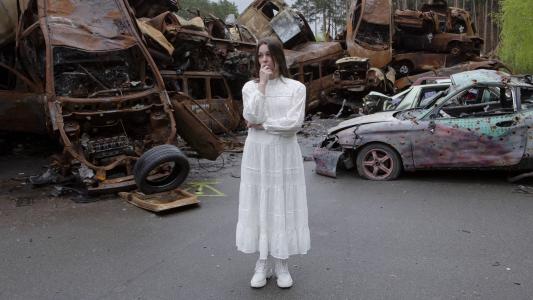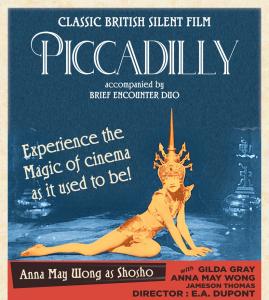Film Reviews
BUXTON SHORTS 2024 - Buxton Film and Buxton Opera House

The setting for this annual short film exhibition was the Pavilion Arts Centre. It was the perfect venue given that all the film makers who had submitted films had to have a link to Buxton or the High Peak.
A large audience had gathered to watch eleven films and vote on their favourite and runner up. The organisers had clearly gone to some effort, providing all the attendees with a programme and a voting slip. We were given a short introduction before the showings got underway.
I had never attended, one of these events before, so I had no idea what format the event would take. This is the second year the event has run since its relaunch in 2023. The organisers are hoping to run a further event next year, with smaller support workshops for aspiring film makers, to help them create their submissions.
Once the showings got underway the sheer variety of themes and approaches was mind blowing. We started with a film (Weird Fishes) about a young girl trying to escape her troubled home life by joining a sailing club. It was haunting in its presentation and the filming methods and soundtrack gave the story more impact. The variety of the films on the bill was emphasised by the second film shown (The Witch is Dead) that showed what can happen when a fast-food witch dies and the result on the local population. It was tongue in cheek and very funny, despite the players keeping a straight face throughout.
In film number three (Local News Website Disorder) we joined a support group for local residents addicted to click bait articles on local newspaper websites. The audience could definitely relate to some of the examples woven into the story.
The fourth film (Meeting in the Park) was shot in Bakewell and was entirely improvised. A man sits alone reading his paper and is joined by a surprising stranger.
The next showing (The Salutation) was an ode to the British pub. I, like the rest of the audience, sat and tried to identify all the local pubs shown. The film highlighted their social value, but also the struggle some have had in staying open.
Film number six (Knightsbridge) was simply set and focussed on a single actor who sits outside her home and reflects on different periods of her life. It was based on a true story and was delivered beautifully.
We left the British Isles for our next film (The Art of Mithila’s soil) which was shot in Jitwarpur in India. The filmmaker had captured the villagers producing art from the soil. The creations were simple, but beautiful and the colours shown provided a real contrast to some of the films already shown.
The Buxton Students Climate conference organised by Transition Buxton was the next film shown. It was really heartening to see local school children of all ages learning about green innovations.
The next film was set in Ukraine (How do you dance in a war zone?). This was so impactful, with dancers moving around settings bearing the scars of war. The accompanying music mirrored the sadness and strangeness of the times.
The shortest film on the bill, followed (Hard Mimes). Three performers performed a gem of a short film with hysterical results – a real counterpoint to the film before it.
The final film of the evening was a folk fable (Mam Tor – Intarsia). A man receives a strange music box which leads him on an adventure into nature and music. It was beautifully shot, and the music was wonderful.
As I said before all the films shown were different and varied in their nature. One thing that they all had in common though, was imagination, hard work, and wonderful performances. I will definitely be going to this event again next year and would encourage you all to give it a go.
April Irwin
SILENT FILM PICCADILLY (1929) WITH LIVE MUSIC - Brief Encounter Duo

In an oak-panelled room of the Leewood Hotel, dimly lit by lamps, the audience sat at tables in a jazz bar set up to watch the silent film classic ‘Piccadilly’. Except in this jazz bar, the music was behind you, blending beautifully and fluidly into the film, allowing you to slow down with it.
The Brief Encounter Duo’s multi-instrument jazz accompaniment to the film ripples into the screen and does not feel excessive or indeed clunky. Meeting the duo in the intermission, Chris and Veronica Perrin spoke of how the music borrowed from pre-1929 vintage jazz as Chris felt it was music the characters would’ve listened to. His grandfather, from whom a love of jazz blossomed, played this old style of jazz too, playing with Frascati’s Orchestra in Piccadilly.
The film itself was Dupont’s sublime, and visionary, ‘Piccadilly’ that played with a carousel of colours and frames to create an utterly mesmerising piece. Piccadilly made a star out of the silver screen deity Anna May Wong, who is the sultry but startlingly young Shosho, a scullery maid in the kitchen of a decadent London nightclub. When she catches the eye of the owner Valentine, a tale of jealousy, forbidden love, and murder unravels in this ‘whodunit’ melodrama.
From a boy whistling as he marched down a hallway to the magnetic interlude where Shosho, bathed in purple light, first performs, each scene was mirrored by the masterful Brief Encounter Duo. The music had this hypnotic element to it where it seemed to heighten the characters’ emotions. The envy, infatuation and insecurity all swirled into this heady cocktail that seemed ultimately very human. Moments of tenderness were elegantly elevated by swan-like piano cascades while bitter rushes of jealousy pierced the screen with sharper sounds. Strangely for such weightless music, the intensity of it was certainly felt, leaving an undeniably dazzling impression on the audience.
Dupont, and writer Bennett, hoped to expose the evils and prejudices of society while also touching on fading beauty, voyeurism, and Orientalism. Piccadilly stands in its own magical dialectic between the East and West, old and young, the glittering West End and seedy Limehouse. Shosho’s performance is an electrifying revelation leaving the audience under her spell. Despite the clandestine trysts, Piccadilly marked a nascent, forthright treatment of interracial relationships. Veronica reflected on how the duo considered re-naming the film ‘The Censored Kiss’, an ode to the dated prohibition of interracial kisses on screen. The aching chemistry between Shosho and Valentine certainly stands as a rebellion to this.
‘Piccadilly’ is a portrait of the Jazz Age’s underbelly that nonetheless seeps with glamour and curiosity. This was the duo’s labour of love during lockdown, with the score taking over two years to compose. Its fruits are certainly compelling. A love letter to a passed art, The Brief Encounter Duo revive the lost paradise of silent cinema and we share their fondness for it completely. I urge you to experience this little treasure for yourself.
Zoe Worth



